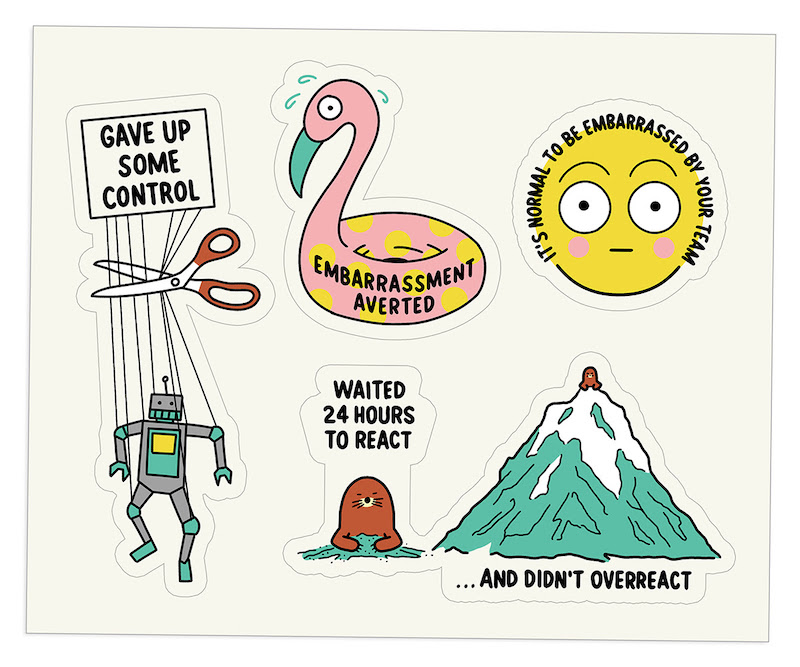Andy: It’s super normal to be embarrassed by your team. I’m often embarrassed by people I trust: my husband, my friends, even my co-founder.
Emma: Hello, that’s me! Sorry!
Andy: Lol you know what I mean. It’s that flash of panic when someone is doing something in front of you, and you aren’t in control. I’m not talking about things that are dangerous, mistakes, off-policy. It’s not “embarrassment” you feel when the work is bad, or someone throws a lamp against the office wall. The feeling you feel then is the appropriate one: this is not how it should be and I need to take action.
Emma: Oh, I totally know. The embarrassment we’re talking about is usually rooted in optics — when what someone is doing isn’t wrong, but your reaction is still omg they need to stop that right now. I’ve felt it when one of my reports nonchalantly sidles in late to a high-visibility meeting. Or sends a sloppy email to important people, or is a little loose-lipped airing our team’s problems at a happy hour.
Andy: I’ve had that feeling big-time in an all-hands meeting when someone on my team asks the CEO a dumb question — they don’t look smart and therefore I don’t look smart and please just stop talking.
But the truth is, you can’t give people autonomy and then also expect them to do everything how you’d do it all the time. This isn’t the 1950s. We don’t manage automatons. Someone is always going to ask the CEO a dumb question because you can’t control whether or not it’s a dumb question to them.
Emma: I fully acknowledge the role optics play in a job, but there’s a reason we left them out of our Good Boss Scorecard. Prioritizing them is dangerous. It breeds micromanagement. It is a catalyst for over-reactions — I told the story before about how I cc’d the report I flamed out over email. I’ve learned that if my reaction to something is to prove “I’ve got this under control,” it likely has to do with optics, and I likely need to take a big step back.
Andy: The best thing to do when you’re in an embarrassment flare-up is to simply let it wash over you and pass. Granted, this is easier said than done, but I’ve never seen a very successful in-the-moment reaction. What would I do: interrupt the person mid-dumb question? Publicly discipline them? What for — making me look bad?
Emma: Ha! Good luck with that argument. I agree that not reacting is the hardest move. It took me a long time to build up the confidence to let my team’s actions stand on their own, and not let my own insecurity take over. In the meantime, it’s helpful to have a process to fall back on — a sort of program you can mindlessly rely on when you may not be thinking clearly.
Andy: This is one that has worked well for us.

How to React When You’re Embarrassed by Someone On Your Team
The first step is to resist reacting. Don’t interact with whoever did the dumb thing you’re embarrassed about. Avoid your boss and the rest of your team. If possible, get some place quiet. If you like verbally processing, phone a friend or nab your favorite co-worker and walk through this worksheet together.
What embarrassed you: _______________________________________________
Example: Jolene asked a bad question at the all-hands. It made my team look dumb and ill-prepared — like they don’t know how to ask smart questions.
Brainstorm all the ways you can address it:
Example:
Have a team-wide conversation on optics and controlling your own narrative
Coach Jolene on what makes a smart question
Role-play Q&A sessions with the team
Post-mortem in Jolene’s next 1-on-1: Why did she ask that question? Did she get the answer she wanted? How did it feel?
Start vetting your team’s questions before all-hands with the CEO
Don’t let Jolene go to all-hands in the future
Discipline Jolene — give her worse shifts, assignments no one wants, additional work, etc
Send an email to Jolene about why her question was bad
Email the whole team using Jolene’s question as a teaching moment
Ignore it — asking the CEO great questions is not actually a priority
etc…
Wait for at least 24 hours. (We recommend two full days.)
This is very important. You need time to separate your embarrassed feelings from the event itself.
How important is it to the success of the people on your team for you to change this behavior?
Example: Important. Jolene is working toward a promotion into leadership, and her actions are being scrutinized.
Go back to your brainstorm. Which is the best approach?
Example:
Have a team-wide conversation on optics and controlling your own narrative
Coach Jolene on what makes a smart question
Post-mortem in Jolene’s next 1-on-1: Why did she ask that question? Did she get the answer she wanted? How did it feel?

Andy: The cool thing about this process is that you can use it proactively to address things that might embarrass you in the future.
Emma: A few years ago, Andy and I were managing a fairly junior team that was invited to a company-wide retreat where there was going to be a lot of free booze. We had a really nice and low-key expectations conversation about drinking around your coworkers. I think it was successful?
Andy: It was totally successful! I mean, no one got naked and puked in the pool.
Emma: Embarrassment: averted.
Good Boss Achievement Stickers: Embarrassment Edition


